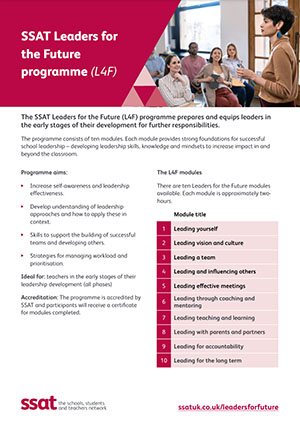Leaders for the Future
Want to retain and develop your next generation of leaders? Become an SSAT Delivery Partner.
The SSAT Leaders for the Future (L4F) programme prepares and equips leaders in the early stages of their development for further responsibilities.

Start date
You decide. Facilitator training will be provided at a date and time to suit you.

Format
Delivery partner (annual licence) and consultancy models available.

Cost
SSAT members: £1,350 + £225 per module
Non-members: £1,825 + £325 per module

Deliver training to groups of up to 20 participants.
Contact us if you’d like SSAT’s education team to deliver this for you.
We know how important it is to have high quality leadership at all levels, and how difficult it can be to recruit. That’s why it’s so important to train and nurture the leadership talent you have. The Leaders for the Future programme gives you access to ten modules available that you can run in your school or across a MAT. Each module covers an essential aspect of leading – developing skills, knowledge and mindsets which participants can use immediately to increase their personal effectiveness and impact beyond the classroom.
Benefits:
- Increase self-awareness and leadership effectiveness
- Develop leadership behaviours and confidence
- Support collaboration and teamwork
Accreditation: All modules will be accredited by SSAT. Participants will receive a certificate for modules completed
Delivery partner training and resources:
SSAT provide online facilitator training for two of your team who will deliver the module content to your participants. Facilitators have access to full module resources and tutor notes.
Leaders for the Future modules
Create your own bespoke programme by selecting your modules and personalising the resources for your leaders. Each module is approximately two-hours. Delivery partners must deliver a minimum of six modules.
Module 1: Leading yourself
Before you lead and manage others, you need to know and manage yourself effectively. This means developing emotional intelligence; understanding your own personality and seeking to understand others, considering how you communicate and how you are perceived by others.
Aims for the module:
- Consider the importance of emotional intelligence for self-leadership and leadership of others.
- Reflect on your own personality and how this impacts your own leadership and those you lead.
- Understand and recognise different personality traits.
- Explore a range of communication styles and consider the implications for leadership.
- Reflect on the impact your behaviours and actions have on others and how you are perceived.
Module 2: Leading vision and culture
This module explores the importance of establishing a clear vision and developing a culture to support learning. The session helps delegates to understand the fusion between vision and culture and the successful team behind its delivery.
Aims for the module:
- Consider how to shape and communicate a compelling vision.
- Reflect on the school vision and your own vision for the work and teams you lead.
- Begin identifying a project focus.
- Explore the importance of school culture.
Module 3: Leading a team
This module explores the key elements of building and leading an effective team and how to evaluate the strengths and weaknesses of particular teams in delivering successful outcomes.
Aims for the module:
- Explore the key elements of building and effective team.
- Reflect upon what effective leaders of teams do and reflect upon their behaviours.
- Understand the elements of a successful project management plan for implementation.
Module 4: Leading and influencing others
This module explores interpersonal skills and influencing approaches to achieve success.
Aims for the module:
- Explore a range of theories and frameworks about leading and influencing others and apply these to your own
context. - Identify influencing skills and approaches to getting buy-in.
- Plan how you might influence different stakeholders in a range of scenarios.
Module 5: Leading effective meetings
This module explores the key elements of leading effective meetings including setting the agenda, managing the discussion, chairing meetings and dealing with problematic behaviours. It also explores managing conflict and how to diffuse anger.
Aims for the module:
- To understand and implement the characteristics of effective meetings.
- Understand the skill of setting agendas and chairing meetings.
- Develop strategies to manage conflict in meetings.
Module 6: Leading through coaching and mentoring
This module explores the different approaches that should be considered when supporting a colleague or leading a team. The session helps delegates to understand when best to use these approaches, strategies to implement and identify the potential risks.
Aims for the module:
- Identify coaching, collaborative and mentoring techniques, applying them to workplace situations as appropriate
- How to select appropriately from a range of strategies to support and collaborate with colleagues
- Apply effective communication skills when working with colleagues to achieve a goal.
Module 7: Leading teaching and learning
This module explores the key elements of leading teaching and learning and an understanding of the importance of great teaching, assessment and evidence-informed pedagogy on young people’s education.
Aims for the module:
- Develop a firm understanding of the principles underpinning assessment and evidence-based pedagogy.
- Explore strategies to improve progress for all pupils using the EEF Toolkit.
- Develop an understanding of the principles underpinning curriculum design.
Module 8: Leading with parents and partners
This module explores the importance of understanding the community that a school serves and how to develop effective partnerships with key stakeholders including parents.
Aims for the module:
- To reflect on who the school community is and why it is important to engage with all stakeholders.
- To consider the importance of parental engagement and how potential barriers can be overcome.
- To consider the role of multi-agency working with children and families.
- To explore how schools can make effective connections with employers and employability.
Module 9: Leading for accountability
This module explores the important issues around accountability in schools and academies and how these measures can be managed effectively to support the balance between improving performance and the quality of learning.
Aims for the module:
- Understand the different accountability pressures facing schools and academies.
- Reflect upon the need for accountability measures.
- Consider the impact of data and other measures used upon standards and workload.
- Explore different approaches to managing the accountabilities from within and outside of schools.
Module 10: Leading for the long term
Teaching requires both long-term and short-term strategies to ensure that teachers stay motivated, healthy and on top of their responsibilities. This module aims to help to think about how they can be effective now and how they can ensure they make the best personal choices about how they want to develop in the future.
Aims for the module:
- Consider your personal effectiveness and strategies for good time management.
- Reflect upon the relationship between pressure, stress, and mental health.
- Explore strategies for self-management to help you thrive throughout your career.
- Engage in career planning and goal setting.
Book a call
Speak with Senior Education Lead Dr Dan Belcher, to learn more about the benefits of SSAT’s leadership programmes.
Book a call
Why SSAT?
SSAT’s experience and impact in leadership development is hard to rival. Many school and system leaders have grown and honed their skills through our leadership programmes. We are passionate about developing leaders at all levels, equipping and supporting them to make a difference and create a brighter future for pupils.
Example: Leaders for the Future annual licence + six modules = £2700 (member price).

Any questions?
Contact us or call 020 7802 2300.
Get in touch

